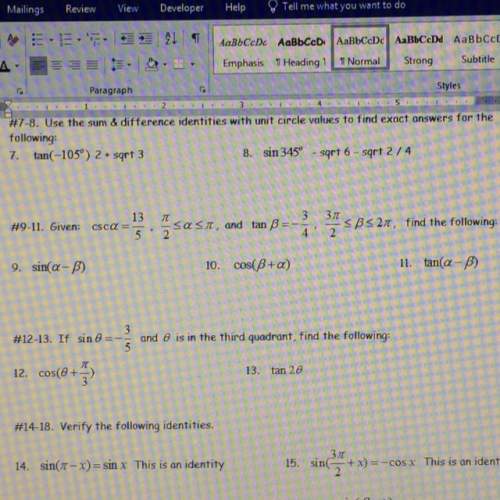
Mathematics, 17.02.2020 23:09, cyaransteenberg
Let Y denote a Bernoulli(θ) random variable with 0 < θ < 1. Suppose we are interested in estimating the odds ratio, γ = θ/(1 − θ), which is the probability of success over the probability of failure. Given a random sample {Y1,...,Yn}, we know that an unbiased and consistent estimator of θ is Y¯, the proportion of successes in n trials. A natural estimator of γ is G = Y¯ /(1−Y¯), the proportion of successes over the proportion of failures in the sample
a. Why is G not an unbiased estimator of γ (show this matematically and explain)?
b. Use the properties of plim (mathmatically) to show that G or Y/(1-Y) is a consistent estimator of γ.

Answers: 2
Other questions on the subject: Mathematics

Mathematics, 21.06.2019 15:30, Leggett3146
On the first of each month, shelly runs a 5k race. she keeps track of her times to track her progress. her time in minutes is recorded in the table: jan 40.55 july 35.38 feb 41.51 aug 37.48 mar 42.01 sept 40.87 apr 38.76 oct 48.32 may 36.32 nov 41.59 june 34.28 dec 42.71 determine the difference between the mean of the data, including the outlier and excluding the outlier. round to the hundredths place. 39.98 39.22 0.76 1.21
Answers: 1

Mathematics, 21.06.2019 19:00, shadow29916
Solve x+3y=6 and 4x-6y=6 by elimination . show work !
Answers: 1


Mathematics, 21.06.2019 21:40, Casey7019
Asystem of linear equations contains two equations with the same slope. select all of the correct statements. i a. the system may have two solutions. - b. the system may have infinitely many solutions. c. the system may have one solution. o d. the system may have no solution. submit
Answers: 3
Do you know the correct answer?
Let Y denote a Bernoulli(θ) random variable with 0 < θ < 1. Suppose we are interested in estim...
Questions in other subjects:



Biology, 27.10.2019 02:43



Mathematics, 27.10.2019 02:43


History, 27.10.2019 02:43








